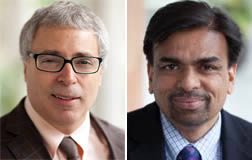Genetics and Frailty
Pinpointing Genes that Protect Against Frailty
August 8, 2014 - (BRONX, NY) - Frailty is a common condition associated with old age, characterized by weight loss, weakness, decreased activity level and reduced mobility, which together increase the risk of injury and death. Yet, not all elderly people become frail; some remain vigorous and robust well into old-age. The question remains: why?

Nir Barzilai, M.D. (left), Joe Verghese, M.B.B.S.Researchers at Albert Einstein College of Medicine of Yeshiva University have been awarded a $3.3 million grant from the National Institutes of Health (NIH) to study the role of genetics in protecting against frailty. The study will be led by Nir Barzilai, M.D., director of the Institute for Aging Research and the Ingeborg and Ira Leon Rennert Chair in Aging Research at Einstein and attending physician, medicine at Montefiore Medical Center, and Joe Verghese, M.B.B.S., the Murray D. Gross Memorial Faculty Scholar in Gerontology at Einstein, chief of geriatrics at Einstein and Montefiore and director of the Montefiore Einstein Center for the Aging Brain.
“People who are frail are more vulnerable to serious complications from falls or surgery and more susceptible to infection,” said Dr. Verghese. “Understanding why some elderly people do not experience a loss of balance or strength and do not suffer from abnormal gait may help us prevent and treat such physical decline.”
The new project taps into the resources of Einstein’s LonGenity Research Study, which builds upon the Longevity Genes Project, an ongoing 15-year study with more than 500 Ashkenazi Jews over the age of 95. LonGenity compares the genetics of the centenarians and their children with those with usual survival. Over the past 10 years, Dr. Barzilai’s team has identified several biological markers that may explain their extreme longevity.
“Understanding why some elderly people do not experience a loss of balance or strength and do not suffer from abnormal gait may help us prevent and treat such physical decline.”
– Joe Verghese, M.B.B.S.
“We have shown that our centenarian participants have a significant genetic advantage over the general population. Their rare genetic variants have allowed them to live longer, healthier lives and avoid or significantly delay age-related diseases, such as Alzheimer's and type 2 diabetes,” said Dr. Barzilai,. “We now want to know if a family history of those same ‘longevity genes’ reduces the risk for frailty.”
The researchers will build on a pilot study funded by the American Federation for Aging Research that linked exceptional longevity to improved physical function and reduced risk of frailty. The Einstein team plans to further those initial efforts to identify gene variants that keep frailty at bay, explore biological pathways that may lead to frailty, and develop drugs that mimic the effect of those frailty-preventing genes.
The five-year grant, “Role of exceptional longevity genotypes in protection against frailty in aging” (R01AG044829), was awarded by the National Institute on Aging, part of the NIH.
Other Top Stories
9/11 World Trade Center Exposure Linked to Heart Disease Among NYC Firefighters
On Becoming a Physician: New Einstein Students Receive White Coats and Stethoscopes
Novel Therapy for Acute Migraine Shows Promise in Phase 3 Clinical Trial
First Complete Wiring Diagram of an Animal's Nervous System
Multimillion Dollar NIH Grant to Help Reduce Opioid Use & Get Care to People Who Need It
NIH Grant Funds $23 Million Study of Diseases Affecting People Living with HIV
New TAILORx Data Guides Adjuvant Therapy in Younger Breast Cancer Patients
Einstein Celebrates Its 61st Commencement
Bolstering Biopsies: Testing Patients' Individual Cells to Guide Treatment



Tablet Blog